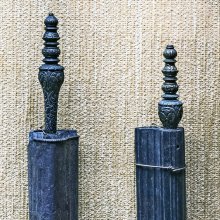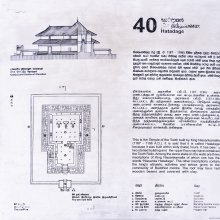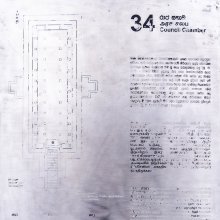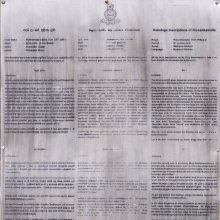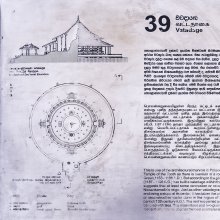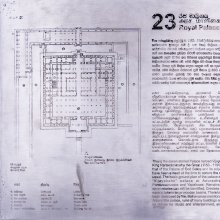Dava, Dāva: 23 definitions
Introduction:
Dava means something in Hinduism, Sanskrit, Buddhism, Pali, Marathi, Jainism, Prakrit, Hindi. If you want to know the exact meaning, history, etymology or English translation of this term then check out the descriptions on this page. Add your comment or reference to a book if you want to contribute to this summary article.
Alternative spellings of this word include Daav.
Images (photo gallery)
In Hinduism
Purana and Itihasa (epic history)
Source: archive.org: Shiva Purana - English TranslationDāva (दाव) refers to a “fire (in the forest)”, according to the Śivapurāṇa 2.5.2 (“The Prayer of the gods).—Accordingly, as the Gods eulogized Śiva: “[...] Obeisance to Thee, the lord of all beings, the sustainer of great burden, the remover of thirst, to Thee whose form is devoid of enmity, to Thee of excessive splendour. Obeisance to Thee, the destroyer of the great forest in the form of great Asuras, like conflagration (dāva-vahni). Obeisance to the Trident-bearing lord who acts as the axe for the trees of Asuras. [...]”.
Source: JatLand: List of Mahabharata people and placesDava (दव) is a name mentioned in the Mahābhārata (cf. V.103.13) and represents one of the many proper names used for people and places. Note: The Mahābhārata (mentioning Dava) is a Sanskrit epic poem consisting of 100,000 ślokas (metrical verses) and is over 2000 years old.

The Purana (पुराण, purāṇas) refers to Sanskrit literature preserving ancient India’s vast cultural history, including historical legends, religious ceremonies, various arts and sciences. The eighteen mahapuranas total over 400,000 shlokas (metrical couplets) and date to at least several centuries BCE.
Shaivism (Shaiva philosophy)
Source: academia.edu: The Yoga of the MālinīvijayottaratantraDāva (दाव) or Dāvanirghoṣa or simply Dāgha refers to the “sounds of a forest-fire” and represents one of the ten kinds of sounds (śabda) according to Jayaratha (author of the 13th century commentary Tantrālokaviveka on Abhinavagupta’s Tantrāloka). Jayaratha cites the Brahmayāmala passage giving this order of the ten sounds (e.g., Dāva).

Shaiva (शैव, śaiva) or Shaivism (śaivism) represents a tradition of Hinduism worshiping Shiva as the supreme being. Closely related to Shaktism, Shaiva literature includes a range of scriptures, including Tantras, while the root of this tradition may be traced back to the ancient Vedas.
Ayurveda (science of life)
Nighantu (Synonyms and Characteristics of Drugs and technical terms)
Source: Wisdom Library: Raj NighantuDāva (दाव) or Dava refers to “forest” according to the second chapter (dharaṇyādi-varga) of the 13th-century Raj Nighantu or Rājanighaṇṭu (an Ayurvedic encyclopedia). The Dharaṇyādi-varga covers the lands, soil, mountains, jungles [viz., Dāva] and vegetation’s relations between trees and plants and substances, with their various kinds.

Āyurveda (आयुर्वेद, ayurveda) is a branch of Indian science dealing with medicine, herbalism, taxology, anatomy, surgery, alchemy and related topics. Traditional practice of Āyurveda in ancient India dates back to at least the first millenium BC. Literature is commonly written in Sanskrit using various poetic metres.
Shaktism (Shakta philosophy)
Source: Google Books: ManthanabhairavatantramDāva (दाव) refers to a “forest”, according to the Manthānabhairavatantra, a vast sprawling work that belongs to a corpus of Tantric texts concerned with the worship of the goddess Kubjikā. Accordingly, “The Lord Uḍu is in (the sacred seat of) Oṃkāra, in which (the Goddess) called Vakrikā was established during the Kṛta Age. (She) sings the Ṛgveda (there) on the surface of the earth and is Kālikā who is called Raktā. (She is) the Command, the awakened consciousness that is (powerful like) a forest fire [i.e., dāva-agni-bodha]. She who is the venerable Kukārākhyā, called the abode of devotion, wanders in the dense forest of the teachings that is under the authority of the lord Mitra and the rest (of the Siddhas)”.

Shakta (शाक्त, śākta) or Shaktism (śāktism) represents a tradition of Hinduism where the Goddess (Devi) is revered and worshipped. Shakta literature includes a range of scriptures, including various Agamas and Tantras, although its roots may be traced back to the Vedas.
General definition (in Hinduism)
Source: archive.org: Vedic index of Names and SubjectsDāva (दाव, ‘forest fire’) is mentioned in the Atharvaveda and the Śatapatha Brāhmaṇa. In the latter work such fires are referred to as occurring in spring. According to Sieg, a hymn of the Rigveda describes a forest fire. Watchers were employed to guard against surprise from such conflagrations (dāva-pa).
Languages of India and abroad
Pali-English dictionary
Source: BuddhaSasana: Concise Pali-English Dictionarydava : (m.) play; sport.
Source: Sutta: The Pali Text Society's Pali-English DictionaryDāva, (Sk. dāva, see dava1 & daya1) in °aggi a jungle-fire J.I, 213; III, 140; Vism.470; DhA.I, 281. (Page 320)
— or —
1) Dava, 2 (Sk. drava to dravati to run, flow, etc. *dreu besides *drā (see dalidda) & *dram (=Gr. drόmos); cp. abhiddavati, also dabba=dravyaṃ) running, course, flight; quickness, sporting, exercise, play Vin.II, 13; M.I, 273; III, 2; A.I, 114; II, 40, 145; IV, 167; Pug.21, 25.—davā (Abl.) in sport, in fun Vin.II, 101; davāya (Dat.) id. Nd2 540; Miln.367; Dhs.1347, cp. DhsA.402.—davaṃ karoti to sport, to play J.II, 359, 363.
2) Dava, 1 (Sk. dava, to dunoti (q. v.); cp. Gr. dais fire-brand) fire, heat J.III, 260.—See also dāva & dāya.

Pali is the language of the Tipiṭaka, which is the sacred canon of Theravāda Buddhism and contains much of the Buddha’s speech. Closeley related to Sanskrit, both languages are used interchangeably between religions.
Marathi-English dictionary
Source: DDSA: The Molesworth Marathi and English Dictionaryḍava (डव).—m ( H) A hollowed cocoanut used as a cup or vessel: also a half or a piece of cocoanut-shell, or a bowl of wood with a handle, serving as a ladle.
--- OR ---
ḍāva (डाव).—m ( H) A game (at chess, ball, sōṅgaṭyā &c.) v khēḷa. 2 A throw or cast (of dice, cowries &c.) v ṭāka. 3 The turn up (of dice). v paḍa, Pr. phāṃsā paḍēla tō ḍāva rājā bōlēla tō nyāva. 4 The time or turn to cast or play. 5 Season, occasion, fit time. 6 The time of prevalence or power; one's opportunity; the day or turn of. 7 The power, grasp, reach, clutch of. 8 A hand at cards. 9 Spite, grudge, malice. v dhara. Ex. jaisā mahā sarpēṃ dharilā ḍāva || tyācēca phaṇēvara paḍalā pāva || tō dhudhukāra ṭākīta dhāvē || ghyāvayā jīva tyācā ||. 10 A scheme, measure, manœuvre, device, stratagem. v khēḷa. 11 R The square (the cloth, board, scratched place on the ground &c.) for playing with cowries &c. 12 f A bowl of wood, cocoanut-shell, or similar thing with a stick-handle, serving as a ladle. Pr. pātrānta asalā tara ḍāvēnta yēīla; Pr. ḍāva asatāṃ hāta bharūṃ nayē. 13 m A description of boat or vessel, a dow. 14 A mark made with a hot iron. gēlā ḍāva (tarīṃ) At the least; at the lowest or worst. ḍāva lāgū hōṇēṃ in con. & vara of s. To lose the game. ḍāvī pēṭaṇēṃ g. of o. To be inflamed or incensed against.
--- OR ---
ḍāvā (डावा).—a Left--opp. to right. ḍāvā ghālaṇēṃ To leave on the left hand in passing. ḍāvī ghālaṇēṃ (dēvāsa &c.) To circumambulate (an idol &c.) leaving it on the left. ḍāvī or ḍāvī guḍhī dēṇēṃ See under dēva & guḍhī. ḍāvīujavī dēṇēṃ-sāṅgaṇēṃ- bōlaṇēṃ To refuse or to grant; to deny or to allow.
--- OR ---
davā (दवा).—f ( A) Medicine, physic, drugs.
--- OR ---
dāva (दाव).—m S A forest. 2 (For dāvānala) A forest on fire.
--- OR ---
dāvā (दावा).—m ( A) Enmity, opposition, contrariety: also spite or grudge. 2 A right or a just claim. 3 In law. A suit or an action. dāvā ugaviṇēṃ or ghēṇēṃ with vara of o. To wreak one's vengeance upon; to take one's revenge. dāvā gāṇēṃ or sāṅgaṇēṃ with vara of o. To mutter threats of vengeance against. dāvā tōḍaṇēṃ To settle claims. dāvā dharaṇēṃ g. of o. To conceive or to hold a spite against. dāvā radda karaṇēṃ To nonsuit. dāvā sādhaṇēṃ To accomplish one's grudge against: also to carry one's suit against. Ex. mhaṇē tukayānēṃ sādhilā dāvā || nyāya sāṅgāvā kavaṇāsīṃ ||.
Source: DDSA: The Aryabhusan school dictionary, Marathi-Englishḍava (डव).—m A hollowed cocoanut used as a cup or vessel.
--- OR ---
ḍāva (डाव).—m A game. The time or turn to cast or play. The time of prevalence or power; one's opportunity. Spite, grudge, malice. v dhara. A bowl of wood &c. gēlā ḍāva (tarī) At the least. ḍāva lāgū hōṇēṃ. in con. & vara of s. To lose the game.
--- OR ---
ḍāvā (डावा).—a Left-opp. to right
--- OR ---
davā (दवा).—f Medicine.
--- OR ---
dāva (दाव).—m A forest.
--- OR ---
dāvā (दावा).—m Enmity, opposition; also spite or grudge. A just claim. A suit or an action. dāvā ugaviṇēṃ or ghēṃṇēṃ with vara To wreak one's vengeance upon. dāvā tōḍaṇēṃ Settle claims. dāvā dharaṇēṃ Conceive a spite against. dāvā sādhaṇēṃ Accomplish one's grudge against.
Marathi is an Indo-European language having over 70 million native speakers people in (predominantly) Maharashtra India. Marathi, like many other Indo-Aryan languages, evolved from early forms of Prakrit, which itself is a subset of Sanskrit, one of the most ancient languages of the world.
Sanskrit dictionary
Source: DDSA: The practical Sanskrit-English dictionaryDava (दव).—
1) A wood, forest; नमो नेदिष्ठाय प्रियदव दविष्ठाय च नमः (namo nediṣṭhāya priyadava daviṣṭhāya ca namaḥ) Śiva-Mahimna-stotra 29.
2) Wild fire, forest-conflagration; वितर वारिद वारि दवातुरे (vitara vārida vāri davāture) Subhāṣ; Bhāgavata 8.6.13.
3) Fire, heat.
4) Fever, pain.
Derivable forms: davaḥ (दवः).
--- OR ---
Dāva (दाव).—[dunāti-du kartari ṇa] = दव (dava) q. v.; कौरव्यवंशदावेऽस्मिन् क एष शलभायते (kauravyavaṃśadāve'smin ka eṣa śalabhāyate) Ve.1.19.
Derivable forms: dāvaḥ (दावः).
Source: Cologne Digital Sanskrit Dictionaries: Shabda-Sagara Sanskrit-English DictionaryDava (दव).—m.
(-vaḥ) 1. A wood on fire, a forest conflagration. 2. A wood, a forest. 3. Fire in general. 4. Heat, (general or physical.) E. du to agitate, affix ac; also dāva .
--- OR ---
Dāva (दाव).—m.
(-vaḥ) 1. A forest. 2. A forest on fire. 3. Fire in general. 4. Heat. E. du to go or run, affix karttari ṇaḥ see dava .
Source: Cologne Digital Sanskrit Dictionaries: Benfey Sanskrit-English DictionaryDava (दव).—i. e. du + a, m. A forest conflagration, [Bhāgavata-Purāṇa, (ed. Burnouf.)] 8, 6, 13.
--- OR ---
Dāva (दाव).—i. e. du + a, m. 1. A forest conflagration, Mahābhārata 3, 2608. 2. A forest, Mahābhārata 1, 8088.
Source: Cologne Digital Sanskrit Dictionaries: Cappeller Sanskrit-English DictionaryDava (दव).—[masculine] fire, heat, also = davāgni.
--- OR ---
Dāva (दाव).—[masculine] conflagration, [especially] of a forest; [masculine] [neuter] forest.
Source: Cologne Digital Sanskrit Dictionaries: Monier-Williams Sanskrit-English Dictionary1) Dava (दव):—m. (√2. du) a wood on fire, [Bhāgavata-purāṇa viii, 6, 13]
2) fire, [cf. Lexicographers, esp. such as amarasiṃha, halāyudha, hemacandra, etc. [Scholiast or Commentator]]
3) burning, heat, [Caraka i, 20]
4) fever, [Horace H. Wilson]
5) a forest, [cf. Lexicographers, esp. such as amarasiṃha, halāyudha, hemacandra, etc.]
6) cf. dāva.
7) Dāva (दाव):—m. ([from] √2. du, [Pāṇini 3-1, 142]) conflagration, [especially] a forest conflagration, [Śatapatha-brāhmaṇa; Mahābhārata] etc.
8) fire, heat
9) distress, [cf. Lexicographers, esp. such as amarasiṃha, halāyudha, hemacandra, etc.]
10) mn. a forest, [Mahābhārata] (always connected with fire), [Raghuvaṃśa ii, 8.]
Source: Cologne Digital Sanskrit Dictionaries: Yates Sanskrit-English Dictionary1) Dava (दव):—(vaḥ) 1. m. A wood on fire; a wood; fire; heat.
2) Dāva (दाव):—(vaḥ) 1. m. A forest; a wood on fire; fire, flame, heat.
Source: DDSA: Paia-sadda-mahannavo; a comprehensive Prakrit Hindi dictionary (S)Dava (दव) in the Sanskrit language is related to the Prakrit words: Dava, Dāva, Dūma.
[Sanskrit to German]
Sanskrit, also spelled संस्कृतम् (saṃskṛtam), is an ancient language of India commonly seen as the grandmother of the Indo-European language family (even English!). Closely allied with Prakrit and Pali, Sanskrit is more exhaustive in both grammar and terms and has the most extensive collection of literature in the world, greatly surpassing its sister-languages Greek and Latin.
Hindi dictionary
Source: DDSA: A practical Hindi-English dictionary1) Davā (दवा):—(nf) medicine, drug; cure; ~[khānā] a dispensary, clinic; —[dārū] medical treatment; medicine; ~[pharośa] a druggist; —[karanā] to be treated (for some ailment); —[na honā, koī] to have no cure (for).
2) Dāva (दाव) [Also spelled daav]:—(nm) stake; opportunity, chance; sleight; a trick (in wrestling); strategy; time(s); turn (in games etc); —[peca] tricks, strategical moves, manoeuvres; —[meṃ ānā (āsānī se)] to be caught with chaff
3) Dāva (दाव) [Also spelled daav]:—(nm) forest wood; ~[vāgni/. ~vānala] forest fire.
4) Dāvā (दावा):—(nm) a claim; suit; -[karanā] to make a claim; to suit; -[dāyara karanā] to file a suit, to launch legal proceedings.
...
Prakrit-English dictionary
Source: DDSA: Paia-sadda-mahannavo; a comprehensive Prakrit Hindi dictionary1) Dava (दव) in the Prakrit language is related to the Sanskrit word: Dru.
2) Dava (दव) also relates to the Sanskrit word: Dava.
3) Dava (दव) also relates to the Sanskrit word: Drava.
4) Dāva (दाव) also relates to the Sanskrit word: Darśa.
5) Dāva (दाव) also relates to the Sanskrit word: Dāpa.
6) Dāva (दाव) also relates to the Sanskrit word: Dāva.
Prakrit is an ancient language closely associated with both Pali and Sanskrit. Jain literature is often composed in this language or sub-dialects, such as the Agamas and their commentaries which are written in Ardhamagadhi and Maharashtri Prakrit. The earliest extant texts can be dated to as early as the 4th century BCE although core portions might be older.
Kannada-English dictionary
Source: Alar: Kannada-English corpusDava (ದವ):—
1) [noun] a woodland; a forest.
2) [noun] wild-fire destructing a forest; forest-conflagration.
3) [noun] fire in gen.
4) [noun] the plant Plumbago zeylanica of Plumbaginaceae family; white lead wort.
--- OR ---
Davā (ದವಾ):—[noun] any substance used as a drug in curing or preventing a disease, healing or relieving pain, etc.; a medicine.
--- OR ---
Dāva (ದಾವ):—
1) [noun] an extensive tract of land having a thick and wild growth of trees and underbush; a forest.
2) [noun] a big, destructive fire; forest-fire; conflagration.
--- OR ---
Dāvā (ದಾವಾ):—
1) [noun] legal action to secure justice in a court of law; a case before a law-court; a law-suit.
2) [noun] ದಾವಾ ಹೂಡು [dava hudu] dāvāhūḍu to file a petition in a court of law; ದಾವಾ ಅರ್ಜಿ [dava arji] dāvāarji a formal, written application filed in a court of law seeking legal action against; a petition; ದಾವಾ ಮಾಡು [dava madu] dāva māḍu = ದಾವಾ ಹೂಡು [dava hudu]; ದಾವಾ ಸೊತ್ತು [dava sottu] dāvāsottu a property involved in a law-suit; ದಾವಾ ಹಾಕು [dava haku] dāvāhāku = ದಾವಾ ಹೂಡು [dava hudu].
Kannada is a Dravidian language (as opposed to the Indo-European language family) mainly spoken in the southwestern region of India.
See also (Relevant definitions)
Starts with (+245): Dava-ghalanem, Davabamga, Davabindu, Davacakapata, Davacakapatagama, Davacalanem, Davacani, Davada, Davadadavada, Davadagdha, Davadagdhaka, Davadaha, Davadahana, Davadahanajvalakalapay, Davadahanajvalakalapaya, Davadana, Davadanem, Davadanti, Davadara, Davadaraphada.
Ends with (+237): Abhiddava, Abhikhyayadava, Abhinavatarkatandava, Adadava, Adapadava, Adava, Adavaadava, Adavatidava, Addava, Agnimardava, Ahiddava, Aindava, Akandatandava, Amardava, Amlavadava, Amrakardava, Anahamandava, Anaindava, Anandatandava, Anaolandava.
Full-text (+114): Davagni, Davanala, Davadahana, Pradava, Antardava, Mrigadava, Davadagdhaka, Davadahanajvalakalapaya, Navadava, Apadavapad, Davalata, Dutaka, Davai, Davasunidhana, Davali, Davasu, Khandavika, Dahu, Davavivarjita, Likandava.
Relevant text
Search found 22 books and stories containing Dava, Dāva, Ḍava, Ḍāva, Ḍāvā, Davā, Dāvā; (plurals include: Davas, Dāvas, Ḍavas, Ḍāvas, Ḍāvās, Davās, Dāvās). You can also click to the full overview containing English textual excerpts. Below are direct links for the most relevant articles:
Sahitya-kaumudi by Baladeva Vidyabhushana (by Gaurapada Dāsa)
Text 10.129 < [Chapter 10 - Ornaments of Meaning]
Text 9.16 < [Chapter 9 - Ornaments of Sound]
Bhakti-rasamrta-sindhu (by Śrīla Rūpa Gosvāmī)
Verse 3.3.101 < [Part 3 - Fraternal Devotion (sakhya-rasa)]
Verse 1.1.26 < [Part 1 - Qualities of Pure Bhakti (bhagavad-bhakti-bheda)]
Garga Samhita (English) (by Danavir Goswami)
Verse 1.3.28 < [Chapter 3 - Description of the Lord’s Appearance]
Verse 5.4.10 < [Chapter 4 - The Journey to Śrī Mathurā]
Rig Veda (translation and commentary) (by H. H. Wilson)
Hari-bhakti-kalpa-latikā (by Sarasvati Thkura)
Text 24-25 < [First Stabaka]
The Tattvasangraha [with commentary] (by Ganganatha Jha)
Verse 2403 < [Chapter 24b - Arguments against the reliability of the Veda (the Revealed Word)]
